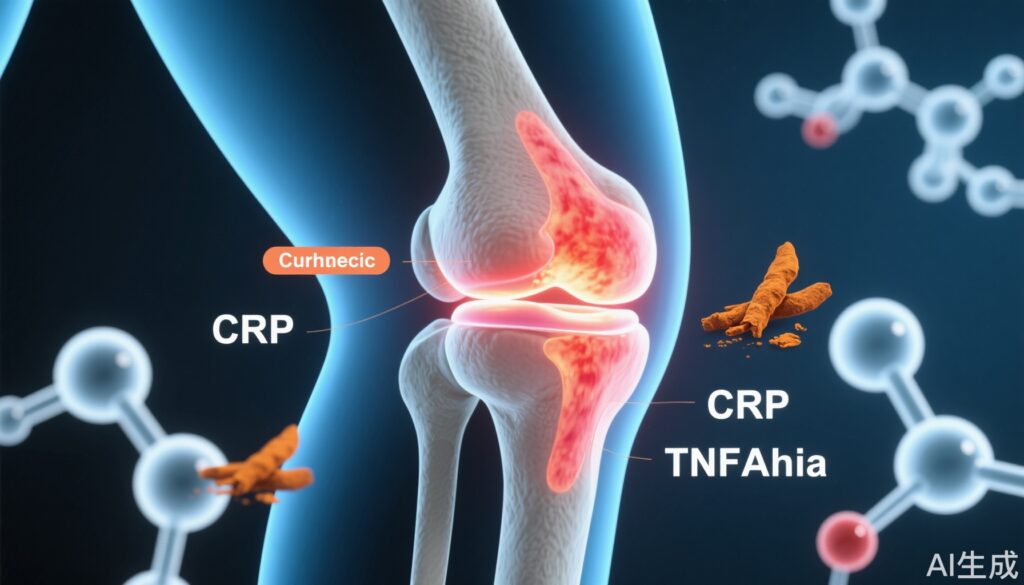Highlights
- Curcumin supplementation significantly reduces C-reactive protein (CRP) and tumor necrosis factor-alpha (TNF-alpha) in patients with knee osteoarthritis (OA).
- No significant effect observed on erythrocyte sedimentation rate (ESR), interleukin-1 beta (IL-1β), interleukin-6 (IL-6), or prostaglandin E2 (PGE-2).
- Meta-analysis includes 21 randomized controlled trials (RCTs) with 1705 patients from seven countries.
- Further large-scale or synovial fluid studies are needed to clarify curcumin’s anti-inflammatory mechanism in OA.
Study Background and Disease Burden
Osteoarthritis (OA) of the knee is a highly prevalent, disabling, and economically burdensome musculoskeletal disorder, particularly affecting older adults. Characterized by progressive cartilage degradation, synovial inflammation, and chronic pain, knee OA leads to reduced mobility, diminished quality of life, and substantial health care utilization. While conventional therapies (e.g., NSAIDs, physical therapy) focus on symptom management, there is a growing interest in adjunctive treatments that target inflammation, a key driver of disease progression and pain. Curcumin, the principal curcuminoid of turmeric, has gained attention due to its potent anti-inflammatory and antioxidant properties, with prior studies suggesting beneficial effects on clinical symptoms of knee OA. However, its effects on objective systemic markers of inflammation remain to be conclusively clarified.
Study Design
This systematic review and meta-analysis, conducted by Hsueh HC et al. (BMC Complement Med Ther. 2025), synthesized evidence from 21 randomized controlled trials (RCTs) enrolling 1705 patients with knee OA across seven countries. The included studies compared oral curcumin supplementation (various formulations and dosages) against placebo or standard care. Primary endpoints were changes in serum inflammatory biomarkers, including C-reactive protein (CRP), erythrocyte sedimentation rate (ESR), tumor necrosis factor-alpha (TNF-alpha), interleukin-1 beta (IL-1β), interleukin-6 (IL-6), and prostaglandin E2 (PGE-2). Data were pooled using standard mean differences (SMD) and 95% confidence intervals (CI), and heterogeneity, sensitivity, and publication bias were assessed.
Key Findings
The meta-analysis revealed several clinically relevant observations:
1. **CRP and TNF-alpha Reduction:**
– Curcumin supplementation was associated with a statistically significant reduction in serum CRP (SMD = -0.906, 95% CI = -1.543 to -0.269, P = 0.005) and TNF-alpha (SMD = -0.921, 95% CI = -1.817 to -0.026, P = 0.044) compared with placebo or control.
– These findings suggest that curcumin may exert systemic anti-inflammatory effects in knee OA patients, particularly targeting key cytokines and acute-phase reactants implicated in synovial inflammation and cartilage degradation.
– Sensitivity analysis indicated stable results for CRP but less consistency for TNF-alpha, likely reflecting greater heterogeneity in TNF-alpha reporting and assay variability among included studies.
2. **No Significant Effect on Other Biomarkers:**
– No significant differences were detected in ESR (SMD = -0.064, 95% CI = -0.064 to 0.541, P = 0.836), IL-1β (SMD = -0.362, 95% CI = -0.816 to 0.092, P = 0.118), IL-6 (SMD = -0.218, 95% CI = -0.806 to 0.370, P = 0.467), or PGE-2 (SMD = 0.413, 95% CI = -0.312 to 1.139, P = 0.264).
– This suggests a selective anti-inflammatory effect of curcumin, rather than a broad-spectrum suppression of all systemic inflammatory markers.
3. **Study Quality and Bias:**
– Funnel plot analysis showed no evidence of publication bias. Sensitivity analysis confirmed the robustness of CRP findings, with no single study unduly influencing the pooled result.
– Sample sizes varied (24–160 participants), and studies were geographically diverse, enhancing generalizability but also contributing to clinical heterogeneity.
4. **Clinical Implications:**
– The observed reduction in CRP and TNF-alpha aligns with previous findings that curcumin improves OA-related pain and function, possibly via modulation of systemic inflammation.
– The lack of effect on IL-1β, IL-6, ESR, and PGE-2 may reflect variable pharmacodynamic properties of curcumin or insufficient study power for these endpoints.
– No serious adverse effects were reported in the included studies, supporting a favorable safety profile for short- to moderate-term curcumin supplementation.
Expert Commentary
The findings of this comprehensive meta-analysis reinforce the growing body of evidence supporting curcumin’s role as an adjunctive therapy in knee OA, particularly for patients seeking alternatives or complements to NSAIDs. The significant reduction in CRP and TNF-alpha—a pro-inflammatory cytokine central to OA pathophysiology—is biologically plausible, given curcumin’s known inhibitory effects on NF-κB signaling and inflammatory mediator synthesis.
However, limitations must be acknowledged. The heterogeneity in curcumin formulations, dosing regimens, and treatment durations among trials complicates direct comparison and dose-response assessment. Serum biomarkers may not fully reflect local joint inflammation; synovial fluid analyses or advanced imaging could provide more disease-specific insights. Additionally, the modest sample sizes and limited follow-up duration in several studies may underestimate long-term or rare adverse effects.
Current guidelines (e.g., OARSI, ACR) do not formally endorse curcumin for OA due to insufficient high-quality evidence, but the accumulating data—including this meta-analysis—may prompt future reconsideration, especially for patients with comorbidities limiting NSAID use.
Conclusion
Curcumin supplementation appears to significantly lower serum CRP and TNF-alpha levels in patients with knee osteoarthritis, supporting its potential as a safe adjunctive anti-inflammatory intervention. However, no significant impact was observed on ESR, IL-1β, IL-6, or PGE-2. Larger RCTs, including studies exploring synovial fluid biomarkers and longer-term outcomes, are warranted to clarify curcumin’s disease-modifying potential and inform clinical practice guidelines.
References
1. Hsueh HC, Ho GR, Tzeng SI, Liang KH, Horng YS. Effects of curcumin on serum inflammatory biomarkers in patients with knee osteoarthritis: a systematic review and meta-analysis of randomized controlled trials. BMC Complement Med Ther. 2025 Jul 4;25(1):237. doi: 10.1186/s12906-025-04951-6. PMID: 40615851; PMCID: PMC12231615.
2. Bannuru RR, Osani MC, Vaysbrot EE, et al. OARSI guidelines for the non-surgical management of knee, hip, and polyarticular osteoarthritis. Osteoarthritis Cartilage. 2019 Nov;27(11):1578-1589.
3. Henrotin Y, Mobasheri A, Marty M. Is there any scientific evidence for the use of glucosamine in the management of human osteoarthritis? Arthritis Res Ther. 2012;14(1):201.



